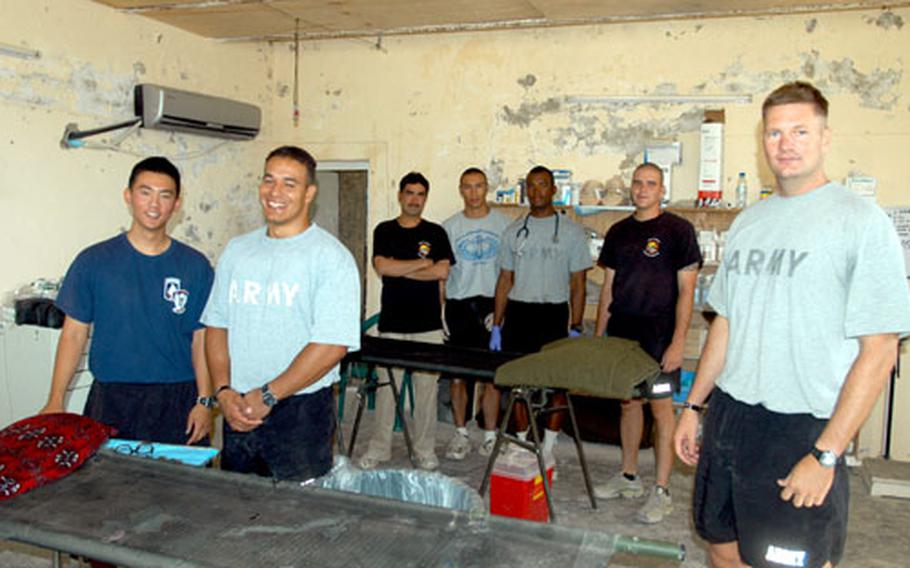
Forward Operating Base Sweeney’s medical team takes a break for a photo after sick call Sunday morning in the base aid station. They are, from left, Spc. Jeeun Park, Sgt. Gary Santiago, interpreter Hikmat Ullah, Cpl. Aaron Medina, Sgt. Samuel Fitz, Sgt. Scott Dinse and Staff Sgt. Jonathan Neal. Dinse is the only soldier who isn’t a medic; he runs the camp dining facility but is cross-training to become a medic. (Jason Chudy / Stars and Stripes)
FORWARD OPERATING BASE SWEENEY, Afghanistan — They’re trained to take care of wounded and sick servicemembers, but medics assigned to the small aid station at this base’s front gate spend much of their time treating Afghan civilians.
In fact, the vast majority of the medics’ cases are Afghan civilians, who trek as far as 30 miles to get free treatment. In the four months since the soldiers from 2nd Battalion (Airborne), 503rd Infantry Regiment, from Vicenza, Italy, have been holding sick call for area residents, they’ve seen more than 1,500 Afghan patients.
“We do sick call five times a week,” said Staff Sgt. Jonathan Neal, 34, of Macon, Ga. “[Cases] range from [roadside bomb] injuries, burns, dental, and … normal ER (emergency room) stuff.”
The two permanently assigned aid station medics, who are augmented by others from the FOB Sweeney-based Company A, provide the best care for miles around.
“They’ve got a [civilian nurse] in Shinkay district, but that’s all they have all the way to Pakistan,” whose border is about 30 miles away, said Neal. “And that’s six hours by car or two days by donkey.”
Neal has been an emergency medical technician since 1989 and has served in the Army as a medic since 1996.
Interpreter Hikmat Ullah said that word of the free medical treatment — and the clothing, shoes and toys given to needy patients — has spread throughout the valley and surrounding mountains.
Afghans come here “because they can’t go to the big cities like Kabul or Kandahar,” he said. “Because of security, nobody wants to go to Kandahar by car.”
Ullah spends most of his mornings interpreting for the soldiers; he has been with them for about 10 weeks.
On Sunday morning, the medics treated about a dozen Afghan nationals with everything from a sore shoulder to bad teeth. One man came in with his right hand and lower arm bandaged, the white gauze covering the stump of a finger lost in a Taliban ambush a few weeks back.
Normally, the medics treat a couple dozen patients a day.
“It varies depending on the actions of the Taliban,” said Neal. “When they’re not threatening the villagers to stay away from the Americans, [we’ll get] about 25 a day.”
Last week, a band of Taliban was operating in the area and the medics averaged eight or nine patients each day, soldiers said.
Much of what the medics treat is simple to cure — intestinal problems from dirty water, fevers, aches, pains and minor injuries.
“Most of these things … could be avoided by drinking clean water,” Neal said. Babies, he said, don’t have clean bottles for their milk or formula, and parents just don’t know how to provide preventive medical care for their children.
Sunday’s dozen or so cases were fairly routine and the diagnoses fairly easy. But sometimes, they said, the diagnosis is technically impossible.
“People fake symptoms to get medicine,” Neal said. Parents will send kids with a list of symptoms relating to the medicine they want.
The medics will ask “Who told you you’re sick and have these symptoms?” said Spc. Jeeun Park, 22. “They’ll be coy at first, then smile.” Usually, they’ll then tell the soldiers that the illness isn’t real.
“After a while it gets annoying,” Park said.
So far, the medics say they’ve directly saved at least eight people.
“Five of them were children,” Neal said. “Pesticide poisoning.”
Young children are drawn to the pesticides because they’re in syrup form.
“We [also had] two really bad trauma cases,” Neal said. “One from a wall falling and one from an IED (improvised explosive device). Also, we had a couple of cops who had been shot.”
Treating area residents may not be the medics’ main mission, but a stitch here or an aspirin there helps the war effort.
“When we take care of the kids in the surrounding areas … [it also] helps us get good intel because they trust you,” he said. “Hopefully, they’ll grow up loving Americans.”